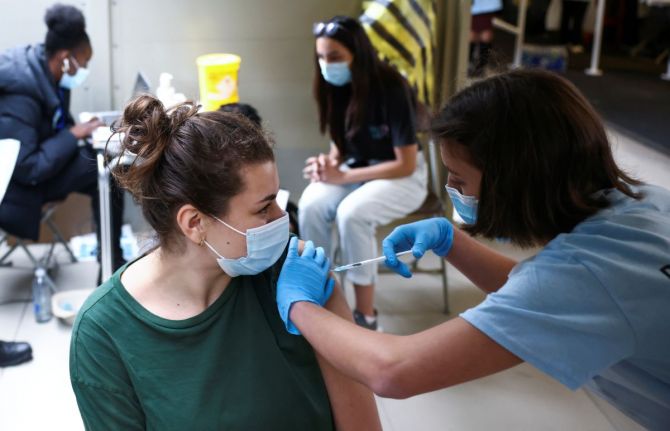More than 700,000 COVID-19 jabs were booked in Britain as people rushed to get vaccinated after the National Health Service opened up its vaccination programme to all adults aged 18 and over, the NHS said on Sunday.

As many as 721,469 appointments were made through the national booking service on Friday -- the day of the announcement -- at an average of more than eight every second. To cope with demand, the NHS said it is using stadiums and football grounds as giant vaccination centres.
"It's incredible to see the enthusiasm young people are showing for vaccination across the country, and it is a testament to the fantastic work of the team in keeping as many people safe from COVID-19 as possible," said UK Health Secretary Matt Hancock.
From walk-in services at sports grounds, including Tottenham Hotspur Stadium and Stamford Bridge as well as Ashton Gate and St Helen's Rugby Ground, to pop up clinics at universities such as in York and Canterbury, NHS said it is "pulling out the stops" to offer convenient vaccine appointments.
"This pandemic has been a challenge for everyone but the various restrictions have hit young people particularly hard. That's why it's good news that COVID vaccinations are now open to all adults across the country, and already well over 3 million people in their twenties have now had their first jab,” said NHS chief executive Sir Simon Stevens.
"Please encourage your friends and loved ones to do the same, as we're now in the race to the finish line. The more of us who are vaccinated, the safer we all are, and the sooner freedom can return,” he said.
The bookings surge came at the end of another "bumper week", which had already seen almost 1.8 million appointments made in just three days after the NHS vaccination programme opened up to people in their early 20s. Some 692,299 appointments were made on Tuesday, when 23 and 24 year olds became eligible for a jab, with another 635,478 booked on Wednesday when the NHS vaccination programme was extended to those aged 21 and 22.
There were another 456,366 appointments made on Thursday, meaning more than 2.5 million appointments were booked in just four days since booking opened to under 25s on Tuesday, the NHS said.

So far, the NHS has given 35.5 million first doses -- 80 per cent of all adults -- and 26 million people have received both doses, meaning they are fully vaccinated. The NHS is contacting people aged 40 and over to bring forward their second dose in line with updated Joint Committee on Vaccination and Immunisation advice.
Latest figures show the NHS in England has delivered over 60 million vaccinations just six months after grandmother Margaret Keenan received the very first vaccine in Coventry in December 2020.
Meanwhile, the UK reported 10,321 new coronavirus cases and 14 more deaths, according to official daily figures on Saturday. Cases have now been above 10,000 for three consecutive days, linked to the highly transmissible Delta variant first identified in India.
While some scientists believe the UK is in the grips of a third wave of the pandemic, there are others who feel it may be too soon to categorise it as such.
"I don't think particularly. We expected that there would be an increase as we gradually opened up but I wouldn't call this a third wave,” Brendan Wren, professor of vaccinology at the London School of Hygiene and Tropical Medicine, told ‘Sky News'.
"The numbers aren't as great and given that such a huge proportion of the population are protected, then it's unlikely to go up and I'd also say that I think the population are more educated. We have better testing and tracing, so I don't expect that we're going to have a huge peak like we've had in January and last year," he said.
There is now some speculation if the July 19 timeline for an end to all lockdown restrictions may be brought forward to July 5, the mid-way mark of the four-week extension that comes into force from Monday.











 © 2025
© 2025